1061 scholarly books by Catholic University of America Press and 17
have author last names that start with E
1061 scholarly books by Catholic University of America Press and 17
1061 scholarly books by Catholic University of America Press
17 have author last names that start with E have author last names that start with E
17 have author last names that start with E have author last names that start with E
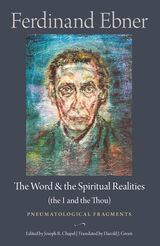
The Word and the Spiritual Realities (the I and the Thou)
Ferdinand Ebner
Catholic University of America Press, 2021
This volume will constitute the first published English translation of Ferdinand Ebner’s seminal 1921 work, Das Wort und die geistigen realitäten – long available in major languages but never in English. It is frequently compared with Martin Buber’s, I and Thou, published in 1923, which actually draws its central I-Thou insight from Ebner.
In recent centuries, Philosophy reflects a turn toward the autonomous subject vs. a biblical sense of person. The limits/failures of science manifest in the horrors of World War I led to the emergence of a “Dialogical Personalist Philosophy” in reaction to the universal doubt of Cartesian thought and to German Idealism, which engages the idea or representation but not the reality of “things-in-themselves.”
The core of Ebner: human speech is constitutive of human existence: humans are given the "word." "Having the word" is a miraculous gift from God. It is only in the word, in language, that an "I" meets a "Thou," that relationship and self-identity can occur, and this word is given in Jesus Christ, the Word made flesh: “In the beginning was the Word”; Jesus, the Logos of St. John's Gospel, mediates between God and man and “stands” between I and Thou. It is through Jesus that it is possible to address God in the human thou.
The key to life’s meaning, to the centrality of relationship, and to God's continuous action in His creation, is found in the I-Thou question: why the I can never be found in itself, and so must look in the thou, while the false I will try to possess the thou as an object of power. This is Ebner's critique of idealist thought: reality, truth, and personal identity are neither ideas, nor found in ideas, therefore, Descartes' cogito must be rejected, for the existence of the I can't be founded or proved by solitary thinking, but only in relation with a thou.
[more]
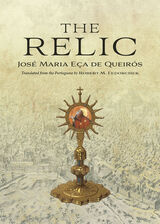
The Relic
Jose Maria Eca de Queiros
Catholic University of America Press, 2023
The Relic tells the story of an orphaned young man, Teodorico Raposo, who is brought to Lisbon from a provincial town in Portugal to live with his aunt, a rigid, stern—and oftentimes—forbidding Catholic. Her devout circle of acquaintances is made up almost entirely of priests, many of whom are more concerned with appearances than spirituality, and seeking her and their approval, Teodorico is driven to attend Mass, say rosaries, and frequent churches, all the while awakening to sensuality, women, and the material life in conflict with “Auntie’s” devotions, which are—inwardly—devoid of the charity preached by Christ.
When Teodorico obtains a degree from the University of Coimbra, Auntie sends him to the Holy Land to search for a relic to cure her ills. He meets up with a learned German author and, after a sojourn to Egypt, the two make their way to the land trod by Jesus. It is there that Teodorico has the dream that takes up nearly one third of the novel: he witnesses the travails that lead to the Passion and Crucifixion, as well as the aftermath of Christ’s death.
Faced now with his mission, Teodorico embarks on a search. He soon comes upon an item, a “true” relic authenticated by his German friend, the sanctity of which will send Auntie to the heights of spiritual bliss, so much so that she will make him her heir. But when Teodorico returns to Lisbon with it, deception awaits her as the result of a simple mistake that had been made, and disinheritance awaits him as a result of Auntie’s anger and vindictiveness.
[more]
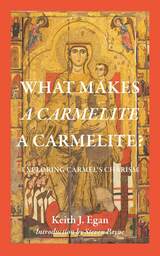
What Makes a Carmelite a Carmelite
Exploring Carmel's Charism
Keith J. Egan
Catholic University of America Press, 2022
Vatican II initiated lively conversations about the identity of religious orders and congregations when the council pointed out that these religious communities are divine gifts in and to the church. Keith Egan examines the nature of these charisms including, not only the original or founders’ charism, but how charisms evolve over the centuries. Special theological attention to these charisms show that they are not something but, in fact, are the dynamic presence of the Holy Spirit.
This volume offers a case study the original charism of the Carmelites. The first Carmelites originated when various hermits were displaced by the armies of Saladin. These dislodged hermits sought refuge on Mount Carmel in a ravine facing the Mediterranean Sea. There, these hermits, now Carmelites, sought from Saint Albert, Patriarch of Jerusalem, a description of their life of solitude. Albert’s Formula of Life describes the original Carmelite charism as a life of prayer and contemplation. This Formula eventually became a Rule that made possible a transformation of hermits into friars. Egan is at work on a sequel that examines this radical transformation.
[more]
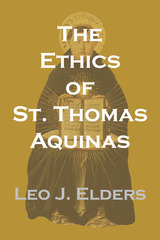
The Ethics of St. Thomas Aquinas
Happiness, Natural Law, and the Virtues
Leo Elders
Catholic University of America Press, 2019
"Elders brings to his study an almost encyclopedic knowledge of the history of philosophy. Although he advises his readers not to look for any novel interpretations of Thomas, the book is full of surprises. Time and again, he offers a concise history of the moral issue under consideration...A more authoritative introduction to the moral philosophy of Aquinas is not likely to be found. In fact, it is a delight to read." - Philosophy in Review
[more]
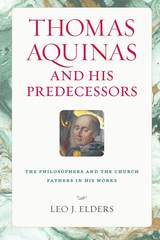
Thomas Aquinas and His Predecessors
The Philosophers and the Church Fathers
Leo J. Elders
Catholic University of America Press, 2018
Thomas Aquinas and His Predecessors takes us on a voyage through the history of philosophical thought as present in the works of Thomas Aquinas. It is a synthetic presentation of the works and thought of the great predecessors of Aquinas, as he kne
[more]
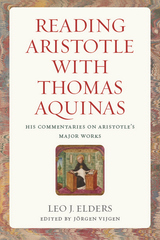
Reading Aristotle with Thomas Aquinas
His Commentaries on Aristotle's Major Works
Leo J. Elders
Catholic University of America Press, 2022
Reading Aristotle with Thomas Aquinas: His Commentaries on Aristotle’s Major Works offers an original and decisive work for the understanding of the thought of Thomas Aquinas. For decades his commentaries on the major works of Aristotle have been the subject of lively discussions. Are his commentaries faithful and reliable expositions of the Stagirite's thought or do they contain Thomas’s own philosophy and are they read through the lens of Thomas’s own Christian faith and in doing so possibly distorting Aristotle?
In order to be able to provide clarity and offer a nuanced response to this question a careful study of all the relevant texts is needed. This is precisely what the author sets out do to in this work.
Each chapter is devoted to one of the twelve commentaries Thomas wrote on major works of Aristotle including both his massive and influential commentaries on the Metaphysics, Physics and Nicomachean Ethics as well as lesser known commentaries. Elders places Thomas’s commentary in its historical context, reviews the Greek, Arabic and Latin translation and reception of Aristotle’s text as well as contemporary interpretations thereof and presents the reader with a thorough presentation and analysis of the content of the commentary, drawing attention to all the places where Thomas intervenes and makes special observations. In this way the reader can study Aristotle’s treatises with Thomas as guide.
The conclusion reached is that Thomas’s commentaries are a masterful and faithful presentation of Aristotle’s thought and of that of Thomas himself. Thomas’s Christian faith does not falsify Aristotle’s text, but gives occasionally an outlook at what lies behind philosophical thought.
[more]
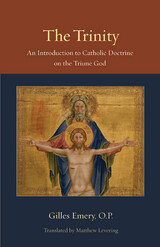
The Trinity
An Introduction to Catholic Doctrine on the Triune God
Gilles Emery
Catholic University of America Press, 2011
No description available
[more]
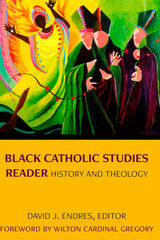
Black Catholic Studies Reader
History and Theology
David J. Endres
Catholic University of America Press, 2021
This first-ever Black Catholic Studies Reader offers an introduction to the theology and history of the Black Catholic experience from those who know it best: Black Catholic scholars, teachers, activists, and ministers. The reader offers a multi-faceted, interdisciplinary approach that illuminates what it means to be Black and Catholic in the United States.
This collection of essays from prominent scholars, both past and present, brings together contributions from theologians M. Shawn Copeland, Kim Harris, Diana Hayes, Bryan Massingale, and C. Vanessa White, and historians Cecilia Moore, Diane Batts Morrow, and Ronald Sharps, and selections from an earlier generation of thinkers and activists, including Thea Bowman, Cyprian Davis, and Clarence Rivers.
Contributions delve into the interlocking fields of history, spirituality, liturgy, and biography. Through their contributions, Black Catholic Studies scholars engage theologies of liberation and the reality of racism, the Black struggle for recognition within the Church, and the distinctiveness of African-inspired spirituality, prayer, and worship.
By considering their racial and religious identities, these select Black Catholic theologians and historians add their voices to the contemporary conversation surrounding culture, race, and religion in America, inviting engagement from students and teachers of the American experience, social commentators and advocates, and theologians and persons of faith.
[more]
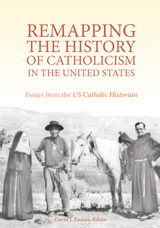
Remapping the History of Catholicism in the United States
David J. Endres
Catholic University of America Press, 2017
For more than thirty years, the U.S. Catholic Historian has mapped the diverse terrain of American Catholicism. This collection of recent essays tells the story of Catholics previously underappreciated by historians: women, African Americans, Latinos, Asian Americans, and those on the frontier and borderlands.
Timothy Matovina’s opening essay sets the theme for the volume, encouraging a remapping of U.S. Catholic history to more widely encompass its various localities and peoples, especially the significance of non-European ethnic groups and the role of Catholics in the American Southwest. Jeanne Petit explores Catholic womanhood’s strength and organizational zeal in the post-World War I era, noting the obstacles and successes of women’s attempts to be recognized fully as American citizens and members of the Church. Anne Klejment weaves together the lives of Dorothy Day and Cesar Chavez to illustrate their use of nonviolence and “weapons of the spirit” to respond to societal injustice. Amanda Bresie provides a window into the life of Mother Katharine Drexel, noting the generosity of the millionaire heiress, but also her meticulous record keeping and close supervision of her funding of educational and evangelization eorts among Native and African Americans. Kristine Ashton Gunnell analyzes the ways in which the Daughters of Charity crossed cultural boundaries to offer charitable assistance to Mexican and Japanese communities in Los Angeles. Matthew Cressler explores the intersection of Black Power and distinctive African American-inspired liturgies, arguing that the liturgy became a site of struggle as black self-determination and nationalism impacted worship and black Catholic identity. Finally, Joseph Chinnici offers an important essay on re-envisioning post-conciliar U.S. Catholicism in its global context, offering a new approach to how we consider the American Catholic narrative and write its history.
Together these path-breaking studies serve as a model for historians seeking to engage in the cartographic task of remapping the U.S. Catholic experience.
Timothy Matovina’s opening essay sets the theme for the volume, encouraging a remapping of U.S. Catholic history to more widely encompass its various localities and peoples, especially the significance of non-European ethnic groups and the role of Catholics in the American Southwest. Jeanne Petit explores Catholic womanhood’s strength and organizational zeal in the post-World War I era, noting the obstacles and successes of women’s attempts to be recognized fully as American citizens and members of the Church. Anne Klejment weaves together the lives of Dorothy Day and Cesar Chavez to illustrate their use of nonviolence and “weapons of the spirit” to respond to societal injustice. Amanda Bresie provides a window into the life of Mother Katharine Drexel, noting the generosity of the millionaire heiress, but also her meticulous record keeping and close supervision of her funding of educational and evangelization eorts among Native and African Americans. Kristine Ashton Gunnell analyzes the ways in which the Daughters of Charity crossed cultural boundaries to offer charitable assistance to Mexican and Japanese communities in Los Angeles. Matthew Cressler explores the intersection of Black Power and distinctive African American-inspired liturgies, arguing that the liturgy became a site of struggle as black self-determination and nationalism impacted worship and black Catholic identity. Finally, Joseph Chinnici offers an important essay on re-envisioning post-conciliar U.S. Catholicism in its global context, offering a new approach to how we consider the American Catholic narrative and write its history.
Together these path-breaking studies serve as a model for historians seeking to engage in the cartographic task of remapping the U.S. Catholic experience.
[more]
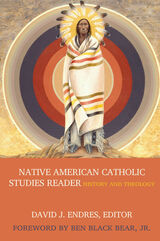
Native American Catholic Studies Reader
History and Theology
David J. Endres
Catholic University of America Press, 2022
Before there was an immigrant American Church, there was a Native American Church. The Native American Catholic Studies Reader offers an introduction to the story of how Native American Catholicism has developed over the centuries, beginning with the age of the missions and leading to inculturated, indigenous forms of religious expression. Though the Native-Christian relationship could be marked by tension, coercion, and even violence, the Christian faith took root among Native Americans and for those who accepted it and bequeathed it to future generations it became not an imposition, but a way of expressing Native identity.
From the perspective of historians and theologians, the Native American Catholic Studies Reader offers a curated collection of essays divided into three sections: education and evangelization; tradition and transition; and Native American lives. Contributors include scholars currently working in the field: Mark Clatterbuck, Damian Costello, Conor J. Donnan, Ross Enochs, Allan Greer, Mark G. Thiel, and Christopher Vecsey, as well as selections from a past generation: Gerald McKevitt, SJ, and Carl F. Starkloff, SJ.
These contributions explore the interaction of missionaries and tribal leaders, the relationship of traditional Native cosmology and religiosity to Christianity, and the role of geography and tribal consciousness in accepting and maintaining indigenous and religious identities. These readings highlight the state of the emergent field of Native-Catholic studies and suggest further avenues for research and publication.
For scholars, teachers, and students, the Native American Catholic Studies Reader explores how the faith of the American Church’s eldest members became a means of expressing and celebrating language, family, and tribe.
[more]
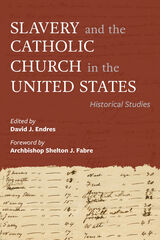
Slavery and the Catholic Church in the United States
Historical Studies
David J. Endres
Catholic University of America Press, 2023
The intertwining of U.S. Catholicism and race-based slavery is a painful aspect of the Church’s history. Many scholars have shied away from this uncomfortable topic, but in recent years a cadre of historians have studied Catholics’ varied roles: as enslaved persons, slaveholders, defenders of slavery, and, in a few cases, advocates of abolition and emancipation.
This collection of nine essays is divided into three sections: enslaved persons and slaveholders, debating abolition and emancipation, and historians and historiography. The studies, many of which are informed by recent archival discoveries, offer a model for historians seeking to understand the relationship between slavery and the Church, not only topically but in terms of methods, contexts, and resources. They contribute to a broader appreciation of religion’s role in race-based slavery and, in doing so, will assist scholars, teachers, and students in the contemporary discussion involving slavery, racism, and their legacies.
Slavery and the Catholic Church in the United States witnesses to the fragility of humanity, which is capable of freedom or slavery, brotherhood or hatred. Yet each chapter offers a ray of hope, suggesting how we might acknowledge and respond to this difficult history.
[more]
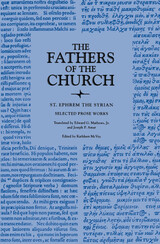
Selected Prose Works
Commentary on Genesis, Commentary on Exodus, Homily on Our Lord, Letter to Publius
Saint Ephrem the Syrian
Catholic University of America Press, 1994
This volume presents for the first time in the Fathers of the Church series the work of an early Christian writer who did not write in either Greek or Latin. It offers new English translations of selected prose works by St. Ephrem the Syrian (c. A.D. 309-373).
[more]
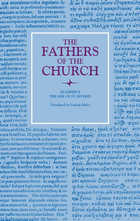
The Life of Saint Severin
Eugippius
Catholic University of America Press, 1965
No description available
[more]
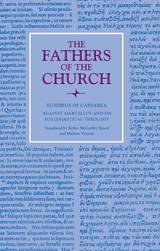
Against Marcellus and On Ecclesiastical History
Kelly Eusebius of Caesarea
Catholic University of America Press, 2018
This is the first English translation of the last two theological works of Eusebius of Caesarea, Against Marcellus and On Ecclesiastical Theology. The first text was composed after the deposition of Marcellus of Ancyra in 336 to justify the action of the council fathers in ordering the deposition on the grounds of heresy, contending that Marcellus was “Sabellian” (or modalist) on the Trinity and a follower of Paul of Samosata (hence adoptionist) in Christology. Relying heavily upon extensive quotations from a treatise Marcellus wrote against Asterius the Sophist, this text provides important information about ecclesiastical politics in the period before and just after the Council of Nicea, and endeavors to demonstrate Marcellus’s erroneous interpretation of several key biblical passages that had been under discussion since before the council. In doing so, Eusebius criticizes Marcellus’s inadequate account of the distinction between the persons of the Trinity, eschatology, and the Church’s teaching about the divine and human identities of Christ.
On Ecclesiastical Theology, composed circa 338/339 just before Eusebius’s death, and perhaps in response to the amnesty for deposed bishops enacted by Constantius after the death of Constantine in 377 and the possibility of Marcellus’s return to his see, continues to lay out the criticisms initially put forward in Against Marcellus, again utilizing quotations from Marcellus’s book against Asterius. However, we see in this text a much more systematic explanation of Eusebius’s objections to the various elements of Marcellus’s theology and what he sees as the proper orthodox articulation of those elements.
Long overlooked for statements at odds with later orthodoxy, even written off as heretical because allegedly “semi-Arian,” recent scholarship has demonstrated the tremendous influence these texts had on the Greek theological tradition in the fourth century, especially on the orthodox understanding of the Trinity. In addition to their influence, they are some of the few complete texts that we have from Greek theologians in the immediate period following the Council of Nicea in 325, thus filling a gap in the materials available for research and teaching in this critical phase of theological development.
On Ecclesiastical Theology, composed circa 338/339 just before Eusebius’s death, and perhaps in response to the amnesty for deposed bishops enacted by Constantius after the death of Constantine in 377 and the possibility of Marcellus’s return to his see, continues to lay out the criticisms initially put forward in Against Marcellus, again utilizing quotations from Marcellus’s book against Asterius. However, we see in this text a much more systematic explanation of Eusebius’s objections to the various elements of Marcellus’s theology and what he sees as the proper orthodox articulation of those elements.
Long overlooked for statements at odds with later orthodoxy, even written off as heretical because allegedly “semi-Arian,” recent scholarship has demonstrated the tremendous influence these texts had on the Greek theological tradition in the fourth century, especially on the orthodox understanding of the Trinity. In addition to their influence, they are some of the few complete texts that we have from Greek theologians in the immediate period following the Council of Nicea in 325, thus filling a gap in the materials available for research and teaching in this critical phase of theological development.
[more]
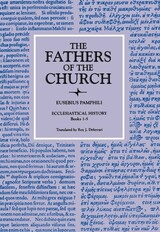
Ecclesiastical History, Books 1–5
Eusebius Pamphili
Catholic University of America Press, 1953
No description available
[more]
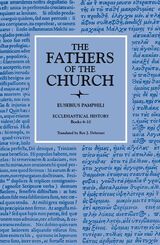
Ecclesiastical History, Books 6–10
Eusebius Pamphili
Catholic University of America Press, 1955
No description available
[more]
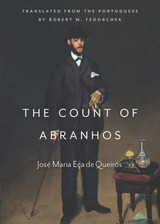
The Count of Abranhos
José Maria Eça de Queriós
Catholic University of America Press, 2020
José Maria Eça de Queirós (1845-1900) was a Portuguese author in the realist style, whose work has been translated into 20 languages. The Count of Abranhos was published posthumously, and this is the first time it has been translated into English.
Alípio Severo Abranhos, born to poor parents in a small town in the north of Portugal, goes off to spend his boyhood and adolescence with an aunt whose material well-being constitutes, for him, the lap of luxury. And he likes and becomes accustomed to luxury. As he follows a course of study for his bacharel at the University of Coimbra, certain negative character traits come to the fore, and upon completion of his degree he leaves behind a pregnant maid to take up residence in Lisbon. In the capital, he calculates—as a young man with neither position, nor fortune, nor social standing—how to get ahead in life. And the path is through marriage to a young woman of social status and promise of a sizable dowry, both of which can facilitate his rise in politics and government. Alípio’s weapons, his means, are various modes of hypocrisy—social hypocrisy, religious hypocrisy, filial hypocrisy, and political hypocrisy, with dishonesty, cowardice, and a farcical duel thrown in for good measure. Eça, like all accomplished novelists, does not tell us what Alípio becomes, rather he lets us see what he becomes, for with his unerring sense of satire, of character portrayal, and plot movement he lets the Count of Abranhos, with his steps and missteps, inform us himself of what he becomes. And with his actions, Alípio Severo Abranhos emerges as the personification, the very epitome, of the grim state of politics in nineteenth-century Portugal, a state engendered by the dogged pursuit of power. And through the obsequious eyes of Alípio’s biographer and the sycophantic hangers-on who wish to glory in his orbit, readers have a clear picture of the “great” man—a type who exhibits universal characteristics not confined to Eça de Queirós’s native country, nor to his time.
[more]
READERS
Browse our collection.
PUBLISHERS
See BiblioVault's publisher services.
STUDENT SERVICES
Files for college accessibility offices.
UChicago Accessibility Resources
home | accessibility | search | about | contact us
BiblioVault ® 2001 - 2024
The University of Chicago Press









